|
FAQs About Soft/Shell Rot, Conditions In
Turtles 15
Related Articles:
Shell Rot in Turtles,
Treating Common Illnesses of
the Red Ear Slider (& other Emydid Turtles) by Darrel
Barton,
The
Care and Keeping of the Red Eared Slider,
Trachemys scripta
elegans by Darrel Barton,
Red Ear Sliders,
Turtles,
Amphibians, Red Eared Slider Care,
Related FAQs:
Shell Rot and Conditions 1,
Shell Rot 2,
Shell Rot 3,
Shell Rot 4,
Shell Conditions 5,
Shell Conditions 6,
Shell Conditions 7,
Shell Conditions 8,
Shell Conditions 9,
Shell Conditions 11,
Shell Conditions 12,
Shell Conditions 13,
Shell
Conditions 14,
Shell Conditions 16,
Shell Conditions 17,
&
Turtles,
Turtles 2,
Turtle Identification,
Turtle Behavior,
Turtle Compatibility,
Turtle Selection,
Turtle Systems,
Turtle Feeding,
Turtle Disease,
Turtle Disease 2,
Turtle Disease 3,
Turtle Reproduction,
Amphibians,
Other Reptiles,
|

|
|
Oscar's shell 3/10/13
Hi,
<Hiya - Darrel here>
I am quite new to turtle keeping and was not a hundred percent sure on
how to identify any possible shell conditions that my little red eared
slider might have. Oscar just got moved to a nice roomy 40 gallon
breeder and seems to enjoy the new tank.
<I like it too. Good work!>
He is quite active and is constantly begging for food when he realizes
that I'm next to the tank.
<Yes, they quickly learn to associate people with food. Remember,
over feeding is a major health problem with out pets - FAR, FAR more
than under-feeding.>
I feed him pellet food once a day ( ZooMed Aquatic Turtle Food -
Hatchling Formula) and give him the occasional cricket, wax worm, and/or
Anacharis.\
<Not bad. If it was me, I'd feed all the ZooMed he could eat in 5
minutes … 4 times a week in summer and twice a week in winter. Now
the treats … not so good. Crickets and wax worms are the
equivalent of candy - no real nutrition. A better treat, no more
than once a month, would be an earthworm or nightcrawler.>
I keep the basking area of his tank at about 85 degrees and provide UV
light with a 5.0 UV bulb. I also do 50 percent water changes weekly if
not twice weekly to prevent too much waste building up in the tank.
<Sounds good>
His shell does feel hard and I did not notice any rotting smell coming
from it. I am, however, concerned with the color of his plastron. It
seems to be slightly pink in color with light brown, almost see through
blotches. I was just wondering if this could be the start of some shell
rot, or if he is developing septicemia?
<It doesn't sound like either, Petrus. Your care and conditions
are far too good to encourage shell rot and a turtle has to be very,
VERY sick before any form of septicemia becomes visible.> I have
attached a couple of pictures of Oscar so you can see what it is I am
talking about, and also attached a picture of his carapace, just in
case. Thank you in advance for any information you can give me.
<I think that the natural dyes in the ZooMed food may be giving him that
tinge in the plates that he is about to shed. As long as Oscar is
active, eating, basks and swims regularly, I think you're OK.>
*Note: The small filter is only going to be in use for the next few
days. Oscar is getting his 525 gph canister filter installed over the
weekend.
<That's a HUGE filter .. Make sure he can't get stuck in the intake.>
<Other that than, I think you're doing well. Go over this
article and see if you have all the basics covered:
http://www.wetwebmedia.com/FWSubWebIndex/RESCareBarton.htm >
|
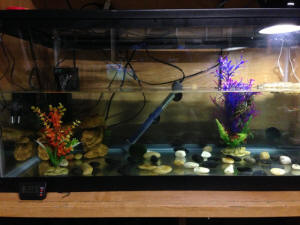
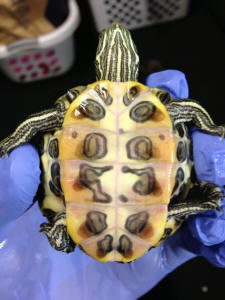
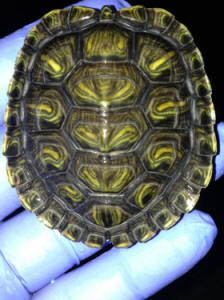 |
|
Glowing Spots on RES Turtle Shell 3/9/13
Hi!
<Hi Vyushti, Sue here with you again.>
You guys have helped me a lot in the past when my turtle fell sick and I
am truly grateful for that.
<I’m glad we were able to help!>
Well this time it's my other turtle Pluto. He has a couple of spots on
his shell which I am assuming is coming from shedding his shell. Those
spots loom like mineral deposits when he's basking but when he's
swimming they glow. Sorry, the picture isn't so clear.
<Yes, it’s blurry; really can’t make anything out from the photo. What
color are they? If they’re a caramel color and ‘glow’ while he’s in the
water as you describe, it may be that Pluto is starting to shed some of
his old scutes. Sometimes when the older scutes start to lift from the
new shell layer underneath, small air pockets form under the old shell
layer. It’s not as noticeable when they’re out of the water, but when
you put them in the water, the water sneaks into those pockets and they
can appear as if they’re glowing.>
He lives in a 9" by 24" tank with a glass shelf that has rocks on it to
bask on. The tank also includes a filter, a 6 watt light
<The wattage of the light should be based on the air temperature. Have
you taken the temperature directly above where he basks to make sure
it’s warm enough? It’s important that it be around 88-90 degrees F (or
31-32 C)>
and a water heater that keeps the water at 26 C.
<This is still warmer than you want it. I know the last time you wrote
you had it set at 28 C so it looks like you’ve lowered it. However, the
water temperature should only be 21 – 22 C (68 – 70 degrees F). This is
what's considered room temperature for most people, so unless you keep
your house really cold, you shouldn't have a water heater at all.
Turtles can’t self-regulate their body temperature, so it’s important
that they be given a clear choice in their environment between cool
water and warm land. Warm water also encourages the growth of fungus and
other organisms that can make him more susceptible to shell infections.>
We feed him Reptomin and occasionally a little carrot, and sometimes
boiled and crushed egg shells to supply him with Vitamin D.
<Crushed egg shells are a good calcium source, but they DO NOT provide
Vitamin D which he absolutely must have. Vitamin D3 is essential for his
shell, his immune system, and his overall health. If he’s not
outside every day you need to get him an artificial UVB light. I know
when you wrote us last year you said you can’t get that where you live.
Have you tried online?
Here’s one source you can try; see if they’ll ship to you –
http://www.petmountain.com/product/reptile-fluorescent-bulbs/11442-504983/reptisun-10-0-uvb-bulb.html
>
<You should be able to find a cheap fixture for this bulb at a home
improvement store.>
<Since even artificial UVB light can’t replace the real deal (the sun),
I'd also suggest that you also supplement the artificial UVB with a
powdered vitamin supplement that has Vitamin D3. Simply sprinkle over
the pellets and let them soak in a small amount of water for 15 minutes
or so before feeding the pellets.>
I just wanted to know if Pluto is actually shedding and it’s going dull
or if he has a fungal infection.
<Unfortunately I really can’t determine this from the photo. If it’s as
I mentioned above, it could be he’s shedding. If it’s white and you can
rub it off with vinegar, then it's possible it could be a fungal type
infection.>
If he has fungal infection, then please tell me what to do.
<If you determine it to be a fungal infection, you should follow the
dry-docking instructions we sent you last year. Keeping him in the water
will encourage the fungus to continue growing.>
<If it’s got a caramel color to it and ‘glows’ under water, it could be
that he’s shedding. If that’s the case you may also want to consider dry
docking until he sheds off his old shell scutes as a preventive measure,
because trapped water under the top shell layer can also lead to
infection.>
And by the way, in between when we got him this new tank he had stopped
basking but started again now, and it was too cold to take him out in
the sun in January-February, plus there was no sun.
<See my notes above regarding dropping the water temperature, making
sure the air above the basking area is warm enough, and getting him an
artificial UVB light.>
Any help would be much appreciated, thanks!!
<Most all turtle illnesses come down to their diet and environment.
Turtles don’t need much, but what they do need they really must have.
Making the fixes to the water temperature, air temperature above the
basking area (if you find it’s not warm enough), getting a UVB light,
and giving him a powdered vitamin supplement with Vitamin D3 will
certainly help stack the odds in his favor of staying healthy.>
|
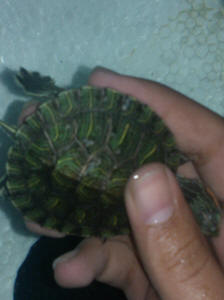 |
|
Does the top of his shell look like its dry or peeling?
Should I do something to fix it? 2/17/13
<Doesn't look particularly odd. Provided the shell isn't soft and/or
smelly, it is probably fine. It is normal for old scutes (the plates
that make the shell) to flake off as the terrapin grows. They usually
peel off whole, and look a bit like hexagonal pieces of see-through
plastic. As your terrapin ages its shell will become darker as well. Do
review the basics here:
http://www.wetwebmedia.com/fwsubwebindex/RESCareBarton.htm
http://www.wetwebmedia.com/fwsubwebindex/turtshellrot.htm
Terrapins are super-easy to keep, provided they have a basking lamp, a
source of UV-B (you can buy combined UV-B and heat lamps that are
extremely convenient), and a source of calcium (such as whole lancefish,
krill, or cuttlebone, given periodically alongside their usual
greens-based diet).
Cheers, Neale.>
|
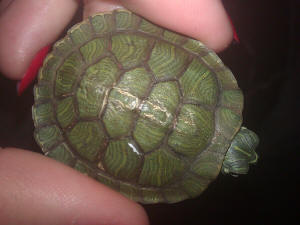
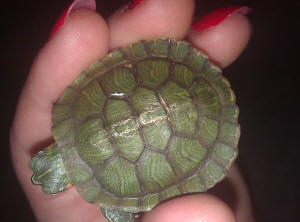 |
|
Hello, crusty RES, rdg. 2/7/13
I stumbled upon your website in search of an answer, I was given a
couple Red Eared Sliders from a friend who simply didn't want them. They
seem healthy, until about a week ago the bigger of the two (Id say about
5.5 inches) developed a white shell I'm not sure what it is any advice
would be greatly appreciated.
<Appears to be just "hard water" (aka Calcium) deposits. Please read
here re:
http://www.wetwebmedia.com/FWSubWebIndex/TurtShelCF13.htm
and the linked files above. Bob Fenner>
|
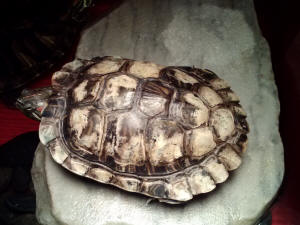
Re: Hello. Crusty RES 2/9/13
If that were the case wouldn't the other have the same thing happening?
<Not necessarily to the same degree... may be sunning more, its shell may be
more scratched... Read where you've been referred. BobF>
|
|
Shell Rotting or Shell Shedding 12/6/12
Hi Darrel! Kriti here!
<Hita Kriti>
I have a RES turtle called Pluto. He lives in a 9" x 24" tank which has a
glass shelf for him to bask on. The tank also has a filter and heater, no
UVB/UVA light, will get that soon. I feed him Taiyo Turtle Food, 3 sticks
everyday, only in the morning. Oh by the way is 1.5 inches (shell diameter).
Anyways yesterday while sunning him I noticed when his shell was dry, it had
some white thingie on it. Sorry the picture is not so clear, but maybe if
you zoom in you will notice it.
<The good news is that what you are seeing is probably nothing but water
spots. Minerals from the water dry onto the shell. The tell-tale
is that the minerals dry in tiny little specs, where a fungus grows it
patches that get bigger. You can clear this up by using a
little bit of household vinegar and a soft toothbrush to clear it from his
shall>
He is my first turtle
<We seem to have some other messages that indicate that you had another
turtle named "Mars" how is he doing?>
and I don't know how they look when they shed or rot their shells. If it is
shedding its okay, but if it is rotting then please tell me what to do.
<Make absolutely SURE that Pluto gets to bask under unfiltered UV-B.
Sunlight is great, but sunlight through glass or through regular window
screen is not effective. Make sure he gets a balanced diet that
contains Vitamins A and D>
<Finally - make sure he has a warm dry place to bask under both heat and
UV-B and nice cool water to swim in. The Basking temp should be 32-34c
and the water should be room temperature, no warmer than 16c to 23c
It's all here in this link:
http://www.wetwebmedia.com/FWSubWebIndex/RESCareBarton.htm >
PS: I live in Delhi, India and vets here are not so knowledgeable.
|
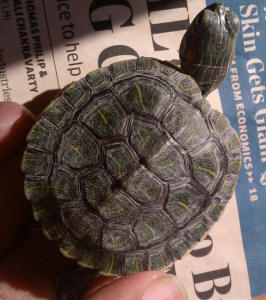 |
|
Just rescued this red ear slider
10/29/12
Dear Crew,
<Hiya - Darrel here>
Pic 1 - Before cleaning and test for soft spots.
Pic 2 - after cleaning and I didn't really feel anything soft but full
thin sections were falling of his shell almost clear witch I believe is
semi normal
(Both pics turtle is in water I did not want to stress him out more then
I needed)
I have been reading your whole website and starting to get very worried.
<I get worried when reading our site, too. I mean … sometimes I wonder
WHAT WAS I THINKING????>
I know this turtle was in bad shape but after reading your website I am
scared the turtle is in worse shape then I thought. The turtle has been
living in a plastic bin by an elderly couple that love animals but
didn't raise this turtle by the book.
<There is a sentence structure here that is unusual. Normally someone
lives by a park or next to a fire station or across from a shopping
center. Rarely does one live by an elderly couple. In this case,
however, the turtle is a victim of an improper modifier: The turtle
lived WITH and elderly couple or was KEPT by an elderly couple.>
<Now that we have that settled, I'll continue with what is actually
important>
The turtle's water was constantly changed but was always only slightly
full not enough to swim or be under water.
<It's a shame when people do that because turtles do like to swim free,
but it's not necessarily unhealthy for them>
Tonight was the first time I think the Turtle has swam in a long time. I
just cleaned the turtles shell sure that no sections did not fall off to
the bone(there was a lot of agley on him) it was tender at growth spots
witch I think is normal and it seemed to be peeling in the new growth(
that's the only thing I have never seen. Please tell me if I should be
full cleaning/removing in the new growth areas.
<Nope - I thin you're doing fine. Now the thing to do is leave him alone
for a while … see that he gets decent environmental conditions (heat,
UV-B, Cool water, etc) and a good diet (Koi pellets or ReptoMin) and
watch for signs that he is alert, active and happy>
Questions
<OK>
1. Do you think its rot?
<Not at this point. The thin sheets that flaked off is healthy growth -
and you don't usually see that in turtles with any significant
infections of the shell>
2. Should I keep him in water at his leisure or do the hot box method?
<From what you're describing, give him "normal" conditions and observe
him>
My mind is going on and on I don't want to start rambling please just
let me know what you think.
<I think you’re doing well>
Ps the turtle is very active and eating and digestive system seem fine.
However I am very worried I am stressing him out way too much. So I am
going to back of him for now. Please let me know.
<They are incredibly resilient animals, Mia. You're doing well with
him.>
Thank you so much for your time! It is a wonderful thing you do to help
keep turtles in good health!!
<Thanks to you, too!>
Thank you,
Mia
|
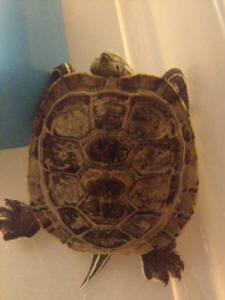
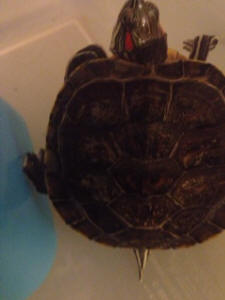 |
My terrapin's shell colour seems to be fading- 10/27/2012
Hello there,
<Hi Lim, Sue here with you.>
I am an owner of a terrapin, or more commonly known as a red eared
slider. She's 7 years old already (in human years) and so far her health
has been quite okay. However, recently I have noticed that she has been
"shedding" her shell and that her skin colour has been getting lighter
by the day.
<Have you had actually had her for 7 years? I ask because turtles
commonly shed the top layer of their shell as they grow. Are the shell
layers you’re now seeing thick, or are they paper thin, translucent, and
hardly noticeable? Has she shed enough of her shell yet for you to see
whether the new shell underneath looks healthy? (If not, don’t remove
the shell; just wait). >
I frequently expose her to sunlight and a diet of anchovies, carrots and
terrapin pellets, of which she often only finishes half of it.
<Would replace the anchovies with an occasional earthworm as her treat.
You might also consider giving her some occasional dark leafy greens.
Also be careful you’re not overfeeding her. A good quality pellet should
be her main staple, and she should only be fed every 2-3 days, and only
as much as she can eat in 5 minutes or so – any uneaten food after that
time should be disposed of.>
I notice too that she seems to have trouble with grabbing her food. The
manner in which she eats is almost lethargic, as though she is unable to
muster up the energy to snap at her food which ends up floating away due
to her slow motion.
<Lethargy is often a sign that turtles aren’t feeling well.>
Although I try to keep her tank in as good a condition as possible, due
to the fact that I am not financially independent yet, my parents are
the ones who have the final say in my terrapin's tank's condition and to
be honest, it is no where near fantastic. See, they do not really like
her for she bites people who are unfamiliar and therefore they refuse to
buy a proper tank and filter for her. The water level in her makeshift
tank (a really long drawer) is pathetically and barely reaching up to
the apex of her shell because my parents refuse to spend that much money
on water weekly. I know that this is a terrible condition for my
terrapin to live in, therefore I am writing in to seek advice on what I
should do. Please help me!
<OK, will try Lim! We’re really dealing with 2 separate issues here,
though. The 1st is how to address the immediate problem of her not
appearing to feel well; the 2nd is the issue of how to best care for her
going forward.>
<As far as what to do right now about her not feeling well, I’m going to
give you a link to an article that describes the most common turtle
illnesses so you can be on the alert for any new symptoms. More
importantly though, it tells you what you can do for her right now to
try and help her. In particular, read the section called, “Isolation and
Dry-Dock” and follow the instructions. Ironically, when turtles are
sick, water becomes more of an enemy than a friend (except for a little
time each day to drink and poop) –
http://www.wetwebmedia.com/FWSubWebIndex/treating%20RES%20Dis%20DarrelB.htm
>
<It’s important to note here, though, that the “Dry-Dock” treatment
option ASSUMES that you’re able to provide her with 3 critical things:
1) a heat source; 2) a UVB source; 3) access to some fresh clean water
each day. To the extent you can’t provide her these things, this
treatment will be of little value.>
I’m also going to give you a link to our care guide – this tells you all
the minimal things you need to provider her -
http://www.wetwebmedia.com/FWSubWebIndex/RESCareBarton.htm >
<As you will see from this article, turtles don’t need very much …
however -- what they do need they must have or they will eventually
become very sick.>
<I also didn’t see you mention anything about providing her with a dry
basking area, heat lamp and UVB light. Does she not have these things
either?>
<Lim – if it turns out you can’t provide her what she needs for Dry-Dock
and/or what she needs going forward once she’s feeling well, then I
really do think you need to give serious consideration to finding
someone who is willing to adopt her and who can provide her with these
things. And really, if you’re family isn’t supportive of you having her,
and is unwilling to even give her enough fresh, clean water, in my
opinion the most caring and humane thing you can do for her at this
point is to locate a loving home for her.>
<I hope this helps. Feel free to write us again if you have any other
questions or concerns; we’ll do our best to help.>
Re: My terrapin's shell colour seems to be fading- 10/27/2012
Okay,
Thank you! I will talk this over with my parents!
You're welcome, Lim. Good luck with it! ~ Sue
|
RES shell problems? Help!
10/2/12
Dear Crew,
<Hiya - Darrel here>
I have two red eared sliders and up until recently they were doing
awesome. They are very active and really enjoy eating and basking. They
jump in the water when scared like normal. I'm not sure why their shell
is turning white-ish but it is really concerning me. I have the UVB
light and a heat lamp (over their basking area). Their water is 80
degrees which I monitor with a thermometer.
<Basking temp should be 88-93 degrees and water temp should be 68 to 72
- basically unheated room temperature. Your water is WAY too hot.>
I feed them the pellets and on occasion the red dried shrimp. I have
also given them small fish which a pet store worker suggested.
<This is why we don't listen to pet store workers. Koi
pellets & Repto-min make a good, basic diet with an occasional earthworm
as a treat.>
They really enjoyed it. I have looked throughout your site but I wanted
your professional opinion before I come to any conclusions.
<OK - first the water is WAY too hot. Remove the heater
completely>
<Second: read:
http://www.wetwebmedia.com/FWSubWebIndex/RESCareBarton.htm >
<Third - if they are eating and active and the shells are firm and don't
smell - it may just be mineral deposits (water spotting) - it happens
all the time>
I added a second picture which I thought was really cute.
<OH SURE!!! They're ALWAYS cute at that age … wait until they grow up
and take your car one night without permission and back it into the
neighbor's tree - THEN we'll see how cute they are!!>
Please help!!
<No worries>
Thanks,
Melissa
|
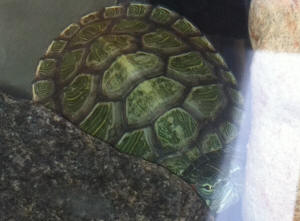
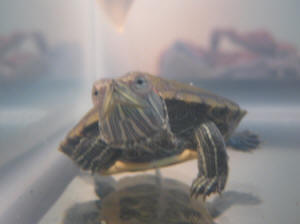 |
|
Re: Darrel rants. Again.
10/3/12
Dear Crew,
<Hiya - Darrel here. Again>
Also, every single site I have looked on says that the water should be
75-80 degrees
<Well then - every single site on the internet is wrong.
Period. I've been where they live, Melissa - and they range
from Pennsylvania to Mexico and the only time a body of water would get
anywhere NEAR 80 degrees is during an unusual dry-spell/drought or other
condition where the body of water is being terribly heated by an
unrelenting sun.>
<Of the many problems and drawbacks to the Internet, the equal weight
given inaccurate and dangerous information is right there at the top.
Worse, one source on the net is used by 10 other sites on the net,
making it appear as if 11 sites have the exact same information - when
in fact it all comes from one stupid person who's mom got him a copy of
Dreamweaver.>
<Another problem is that the internet has given people the attention
span of fruit flies - but I'll address that another time. Right
now it's 80 degree water. Where, in nature is the water 75-80
degrees except in a hot spring?>
<The water should be 68-72 degrees and the basking area air/surface
should be 88-93 degrees - this allows the turtle to CHOOSE between
heating up when he feels cool and cooling off when he feels warm.
Remember … your turtle is an expert at being a turtle. He/she
knows what he needs - you have to give him the choice>
<What you've given him is a choice between being warm and very warm>
http://reviews.petco.com/3554/5070/zoo-med-zoo-med-aquatic-turtle-food-growth-formula-reviews/reviews.htm
This is what I feed them, is that okay?
<It's fine. Zoo Med makes quality stuff. Koi Pellets are
cheaper and have the same basic formula. I raise them from
hatchlings to breeders on Kay-Tee brand Koi pellets and occasional
earthworms.
|
|
Re: More RES questions...I think he/she is stressed
9/8/12
Hello Sue, thanks for the prompt response!
<You’re welcome, Sonja!>
Please forgive me for another lengthy email. I love this little guy
and want to give him the best life that I possibly can. I just want to
ask a few more questions and add a few comments.
<No problem. I have a few of my own that I feel the same way about.>
I am not worried about the water conditions; the filter seems to be
functioning fine, and is for twice the size of his aquarium. Since he
has been at my work I had been giving him 100% water changes. I intend
to change his water 100% this Saturday and every Saturday here on out (for
some strange reason I luv the lil guy/gal).
<Yes, they do tend to grow on you the longer you have them.>
When he gets his larger habitat I intend to use the current filter and a
canister filter that I have already acquired. I have checked his PH
regularly and the most it has shown at was 8 otherwise it is generally at 7.
From what I’ve read this is good right?
<pH isn’t as critical for turtles as it is for fish. Just plain tap water
that’s safe enough for you to drink is fine for them. >
I am also seriously looking into a Marimo ball as they sound like they do
wonders!
<Unfortunately, I don’t have any experience with these so can’t advise you.
But I did pull up some comments mentioned about them on another website
about turtles --
http://www.redearslider.com/forum/viewtopic.php?f=6&t=27212 >
<From the comments I read here, it sounds like you want to make sure it is a
real one, not a fake one, as I read that the fake ones can contain Styrofoam
and pieces of other material that can be harmful to them. It also
sounds like it has the potential to clog your filter and make things messy
in the water if they tear it apart. If you find this is happening, you may
want to hold off on it until you have him at home with you. When it
comes to water quality and turtles, sometimes less is more if you know what
I mean!>
Mikey has a floating basking rock that he is slightly too big for (which we
are in the process of looking for something sturdier and bigger for him).
<I know Zoo Med for one makes floating docks in an extra-large size. You may
want to check it out to see if it would work for him.>
When he was at my work he never climbed on it. When I brought him home
I used the filter to support the dock so now he can and does climb up on it
and is able to bask (if awkwardly).
<As long as he can get his entire body out of the water to dry off, it
should be fine.>
I have been very punctual with the 12 hours on and off with both the heat
lamp and the UVB bulb….(I wonder if I shouldn’t have slowly increased the
time to 12 hrs since prior to moving in with me he only had a UVB on 7 hrs 5
days a week…could this be stressing him?).
<No, I doubt that would do. They get more stressed out by changes in general
scenery; even when you just re-arrange things in the same tank! They are
very much creatures of habit and like a familiar looking environment. They
are also sensitive to vibrations that you and I wouldn’t even notice. So it
can sometimes take them several days or longer to adjust to being in a new
place.>
I have also found, since asking the question that taping dark paper or
newspaper over part of the aquarium will make him feel more secure. I
taped some newspaper on half his aquarium earlier this evening (prior to
response).
<Not a bad idea, especially if he’s in a high traffic place.>
I also removed the water heater as soon as I read your recommendation!
<Very good!>
FYI…The covered heater is covered in green plastic so that he can’t break
the heater. My local pet store told me he needed it, but they also told me
he should be fed twice a day which is very contradictory to everything I’ve
read in addition to what you have said! I get sad thinking that their
recommendations are based on the turtles that they keep there! Maybe
if I get better at this I can rescue them all lol!
<Yes, unfortunately the very people who sell them are often the people who
know the least about them, unless you’re in a specialty store. But
then – those people know enough about them that they don’t sell them because
they don’t want to encourage the trade! Best bet if you ever decide
you want any more is to try to rescue one. If you Google online there are a
couple of organizations in particular that have a rescue service.>
As far as food goes…NO MORE BUGS! I gave him a feeder fish when I
first brought him to my house last Friday. Since he lost his appetite
last time he switched habitats, I thought this would mitigate the problem.
He ate it…but after he struggled to catch it (and my husband had to disable
the fish first). Since then he hasn’t eaten anything. Maybe he
is sick from the fish? Is that possible? It wasn’t a goldfish
according to the pet store guy; he called it an orange guppy.
<I wouldn’t use feeder fish at all; they’re known to carry diseases. Just
stick to a good quality pellet as the staple, and an occasional earthworm or
two every few weeks (ones that haven’t been exposed to lawn pesticides).
It’s also OK to offer them greens like red or curly leaf lettuce for
additional fiber.>
I also have other questions about food. I don’t know what Koi pellets
are, and I don’t think they have them at my pet store?
<They can usually be found in the pond section of the store. I’ve even seen
them sold at home improvement centers that carry other pond supplies. I know
petsmart.com sells Kay tee Koi pellets online. I get the smaller Koi pellets
that are sold in a canister as opposed to the larger pellets that tend to be
sold in large bags.>
I have ReptoMin Select-A-Food. I’ve read that I should not give him
the shrimp from ReptoMin, and will no longer offer it. As for the
green bits, are they okay? If you give me a brand name of good food I
can order it online.
<I actually just use the regular ReptoMin pellets, and alternate that with
the Koi pellets. Sometimes I also occasionally alternate in Zoo Med
maintenance pellets (the largest pellets) because they contain less
percentage of protein content.>
As I mentioned, for some reason I love this guy and only want to do what is
best for him/her. I also purchased Nature Zone Bites for him today.
The box says they are specially formulated appetite stimulating color and
flavor, are these bad?
<The more processed ingredients (artificial colors, flavors, etc.) you can
avoid the better. So I’d avoid all this stuff and just stick with the
basics. Actually, that would be my recommendation for humans too!>
I put some in his aquarium before your response and he did not eat them.
<Not surprised. Probably tastes like paper to him, much like some of our
processed food tastes!>
I’ve read that a turtle can go from 2 days to a month without eating after a
habitat change. Does this sound right to you?
<Yes. Though if he goes beyond a week without eating, I’d be checking for
any other signs that he might be ill as well as making sure you’re giving
him everything he needs.>
It concerns me that his refusal to eat might be because of habitat change,
because I am trying to get him a bigger habitat. This means another
change! How long should I wait before giving him the bigger habitat?
I have been eyeing up a 75 gallon for $179. I see that you say a
plastic container is sufficient as well, but I couldn’t find one that was 4’
long.
<I’ve seen one by Sterilite (Clear view latch) sold at Target that’s 110
quart that’s 3’ long and about 18” wide that could possibly work for you
(though you might have to build a custom screened top for it - 1/2” holes
minimum - depending on the type of lights you have). But the good news is
that the bin itself only costs about $13!>
We are in a small town, so that may be part of the problem. I will
keep looking over the next week at other stores. The pet store told me
they would have a sale on the aquarium at the end
of the month, which gives me time to look for a plastic container first.
<If you can afford a glass one its’ always nice and will hold up better
(less scratches) over time. But the plastic ones are perfectly acceptable as
an alternative. However, I know you’re turtle is already 6.5”, so
given that you might also want to consider buying him one a large one that
will carry him/her until fully grown rather than continuing to upscale as he
grows. If you do decide to do this, try to go for ones with the largest
possible surface area rather than looking only at the number of gallons.
Turtles appreciate length/width more than depth (though they do need at
least enough to right themselves up if they flip over accidentally). When it
comes to large enclosures, you may find that you’ll get more for your money
with some sort of heavy duty plastic tank than you would for the glass
equivalent. For example, Rubbermaid makes a line of stock tanks and
MacCourt makes some reasonably sized preformed ponds – they even have a nice
rectangular one about 5’ long that’s easier to fit in a room than other
free-form shaped ones; can order through Lowes). And crazy people (like me!)
actually have them indoors as well as outdoors.>
I also want to add that Mikey is definitely shedding. He/She looks
golden under water and thin
flakes are peeling from his/her shell. I think this is good because a
lot of the algae that stuck to him even after I took a gentle toothbrush to
him are finally disappearing. The white spots still concern me and are
evident constantly. I still fear that they are some sort of
bacteria/fungus from not being able to bask when he/she first began
shedding.
<Could be. Shedding does occur naturally as part of the growth process;
however sometimes shedding (especially when accompanied by whitish patches
that look like fungus), can also occur when there’s an issue with water
temperature, water quality, or lack of basking/dry heat/UVB.>
Just to be safe, if he doesn’t eat by Sunday I intend to dry dock him just
in case.
<Sounds like a good plan.>
On the website you gave it says: “a shallow container of luke warm (room
temp) tap water every day for 5 minutes in order for him to drink, poop and
possibly eat. Shallow means no more than half his shell under water when you
place him in it -- and really only enough to cover his tail and cloaca.
Assuming that he is being treated for his actual condition and improving, he
can go YEARS in this condition without ill effects. Do NOT place him in
water over his head!” Since he still swims can I just put him back in his
tank? Should I really only give him shallow water?
<The instructions here are general guidelines that are intended to cover a
wide variety of ailments as well as seriousness of illness. They are
fine to follow for your turtle as well. However, since the issue with your
turtle is a shell fungus vs. a respiratory condition, it’s OK to let him
swim in deeper water, as long as it’s newly changed water.>
If I supervise him can he go back in his tank for 30 min or so?
<That should be OK, but the general idea is that while you’re trying to get
rid of the fungus you want to keep him as dry as possible for as long as
possible. Fungus thrives in wet environments so you want to minimize
that as much as possible. What you may want to do once he’s out of the water
is apply some antifungal cream – see separate section in this link – before
putting him back in the dry dock bin.>
Also, if he isn’t eating because he is stressed, will dry docking him make
it worse?
<Yes and no. Yes it’s a new environment and he won’t like it, but at the
same time warm and dry tends to increase their appetite. I’d still err
on the warm and dry side whenever you have any question about their health.
>
<Also one thing to keep in mind when you’re trying to figure out why he’s
not eating – if he’s thrashing about anxiously when you try to feed him,
he’s likely not eating because he stressed. If, on the other hand he seems
lethargic he’s likely not eating because he’s sick. And then unfortunately
there’s always those shades of gray in between … But in general you want to
be observing not only his appetite but also his behavior for clues.>
I don’t want to dry dock him before Sunday because I will be at work, and I
want to be able to keep an eye on him. Plus, I think I should give him
a full week before deciding he is sick. Also, in case you think dry
docking him will make him worse if he is just stressed, I don’t want to risk
it.
<Definitely won’t make him worse; in terms of his health will only help.
I’ve even done this with one or two of mine on occasion when they’ve skipped
two of their feedings in a row – or the equivalent of a week without eating.
In all cases the warm and dry got them back on track. Just make sure
you carry over the UVB along with heat when you transition him.>
I kind of don’t think he is sick because he is new at my house; but I do
think something is wrong because he is not following the exact behavior
changes he did the first time he changed habitats. Regardless, I found
a vet who seems willing to look at a turtle, but they can’t see him until a
week from today (next Thursday) if he isn’t doing better.
<What I’d do is put him in Dry-Dock if he still doesn’t eat for you on
Sunday (tomorrow!) See if that jump starts his appetite and gets him
eating by Thursday. If he still hasn’t eaten by Thursday I would go on
his behavior. If he seems more inactive than usual, I’d have him seen. If
he’s alert, active, clamoring to get out of your hands and swimming
voraciously around in his tank when you give him his daily soak, then I
might give him a few more days in Dry Dock and see how it goes.>
Going back to the male female thing….I think he is a she. The lady who
he came from said the vet said he was a boy. He has short claws and a
short tail, from what I read this makes him a female…Of course I thought his
claws and tail were long until I saw other pics of RES.
<From your description “he” sounds like a “she” to me!!>
|
 
 |
|
Re: More RES questions...I think he/she is stressed
9/11/12
Thanks so much for your help! She ate today too!
<That's great Sonja; sounds like she’s turning a corner!>
I let her roam around the room she is in while cleaning her tank. While
she explored she started climbing up on anything she could find (like
the cat bed and into my desk's cubby). When I put her back in the tank I
tried to offer her some pellets and she ate! I used a net to pull out
the uneaten ones. Maybe she just wanted to see more of the surroundings,
or maybe the water change helped. Regardless she ate! I will try to give
her a few more pellets tomorrow to see if she really does have her
appetite back. After that I will feed her Tuesdays-Thursdays-Saturdays.
<That sounds fine.>
Thanks for letting me know that PetCo online sells those pellets.
<It’s actually petsmart.com, not petco.com that sells the smaller
canister of Kay-Tee Koi pellets.>
I will check the hardware store first, if they don't have it I will
order it from PetCo. Also, thanks for the good information on the
aquariums. I think I will look for something longer than a 4' X 20" as
she will continue to grow. Plus the more room, the happier she will be!
<I agree, the larger enclosure is the wiser move if you can do it. She’s
very lucky to have you as her turtle mom!>
I guess she just needed time. The white spots have disappeared in
some spots, I think because of the shedding. The other side still
has the white spots but it is flaking on that side now too. I
think her shedding is progressing quickly and she looks a lot better
without all the algae she had on her before! As long as she
continues to look and act better, then I will avoid dry docking her, but
I will diligently inspect her behavior daily!
<Yes, along with physical signs and symptoms, their behavior also
provides important clues about how their feeling. The fact that she's
alert, active, curious, walking around AND eating are all good signs
that things are improving!>
<Good luck with her! If any more concerns pop up, feel free to write in
again. Cheers! Sue>
|
Baby RES Turning Brown 9/2/12
Hi crew,
<Hi Dennis! Sue here.>
I have had 2 baby RES for about 1-1/2 weeks. They are about 1.5" in
length now.
<Congrats on your new additions. They’re so cute at that size, aren’t
they?!>
One looked like what a RES is supposed to look like; the other one was a
noticeably lighter green and had an almost "featureless" carapace, i.e.
no whorls and such.
<Actually RES turtles ARE typically a lighter green color when they’re
small/young. They grow darker in color as they age. But that
doesn't usually happen until they become larger than yours.>
Now the former still looks the same, but the latter is turning a darker
green and brownish, especially along his backbone. I am just worried
about the latter's quick change in colouration, even though their
behaviour is normal.
<I agree that color change in their shell doesn’t happen this quickly.
My guess is that something is amiss in your environment, in particular
the water quality. >
<Can you write us back and provide us more information about your set-up
and what care advice you were given when you bought them? What
size aquarium are they in? Did you purchase a filter? If so, what
size filter is it, and how many gallons per hour is it rated for? How
often are you doing water changes? How much are you feeding them
and are you removing any uneaten food from the water? What
temperature are you keeping the water at? These are the questions
that first come to my mind to try to answer before looking at other
possible causes for the sudden change in shell color.>
<It would also be helpful to know what type of heat and lighting you’re
providing them for basking – and if/how long they’re out of the water
basking for each day. Depending on your answers, these could also be
playing a role.>
Please advise.
Thanks & regards,
<You’re welcome, Dennis. While we’re waiting to learn more, I’m
going to give you a link to our basic care guide. Compare what you’re
providing them to what’s recommended in this guide and make whatever
changes might be necessary. Regardless of the reason(s) for the sudden
change in shell color, either way it’s important to be providing them
with all the things recommended in this guide.>
Dennis
<Oops! Sorry, Dennis, I forgot to include the link I referenced in my
reply below. Here is is--
http://www.wetwebmedia.com/FWSubWebIndex/RESCareBarton.htm >
|
|

